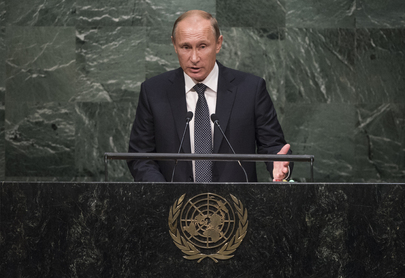
Authored by Daniel Lazare via The Strategic Culture Foundation,
June turned out to be the cruelest month for the Russia-gate industry.
The pain began on June 8 when ex-FBI Director James Comey testified that a sensational New York Times article declaring that “members of Donald J. Trump’s 2016 presidential campaign and other Trump associates had repeated contacts with senior Russian intelligence officials” was “in the main … not true.”
Russian President Vladimir Putin addresses UN General Assembly on Sept. 28, 2015. (UN Photo)
Then came Republican Karen Handel’s June 20 victory in a special election in Georgia’s sixth congressional district, sparking bitter recriminations among Democrats who had hoped to ride to victory on a Russia-gate-propelled wave of resistance to Trump.
More evidence that the strategy was not working came a day later when the Harris Poll and Harvard’s Center for American Political Studies produced a devastating survey showing that 62 percent of voters see no evidence that the Trump campaign colluded with Russia, while 54 percent believe the “Deep State” is trying to unseat the President by leaking classified information. The poll even showed a small bounce in Trump’s popularity, with 45 percent viewing him favorably as opposed to only 39 percent for his defeated Democratic rival Hillary Clinton.
The mainstream news media also came in for some lumps. On June 23, CNN retracted a story that had claimed that Congress was looking into reports that the Trump transition team met secretly with a Russian investment fund under sanction from the U.S. government. Three days later, CNN announced that three staffers responsible for the blooper – reporter and Pulitzer Prize-nominee Thomas Frank; Pulitzer-winner Eric Lichtblau, late of the New York Times; and Lex Haris, executive editor in charge of investigations – had resigned.
Adding to CNN’s embarrassment, Project Veritas, the brainchild of rightwing provocateur James O’Keefe, released an undercover video in which a CNN producer named John Bonifield explained that the network can’t stop talking about Russia because it boosts ratings and then went on to say about Russia-gate:
“Could be bullshit, I mean it’s mostly bullshit right now. Like, we don’t have any big giant proof. But … the leaks keep leaking, and there are so many great leaks, and it’s amazing, and I just refuse to believe that if they had something really good like that, that wouldn’t leak because we’ve been getting all these other leaks. So I just feel like they don’t really have it but they want to keep digging. And so I think the president is probably right to say, like, look, you’re witch-hunting me, like, you have no smoking gun, you have no real proof.”
Project Veritas also released an undercover video interview with CNN contributor Van Jones calling the long-running probe into possible collusion between Trump’s 2016 campaign and Russia a “nothing-burger,” a position similar to the skepticism that Jones has displayed in his on-air comments.
True, the Bonifield video was only a medical reporter sounding off about a story that he’s not even covering and doing so to a dirty-trickster who has received financing from Trump and who, after another undercover film stunt, was ordered in 2013 to apologize and pay $100,000 to an anti-poverty worker whose privacy he had invaded.
Good for Ratings
But, still, Bonifield’s “president-is-probably-right” comment is hard to shake. Ditto Van Jones’ “nothing-burger.” Unless both quotes are completely doctored, it appears that the scuttlebutt among CNNers is that Russia-gate is a lot of hot air but no one cares because it’s sending viewership through the roof.
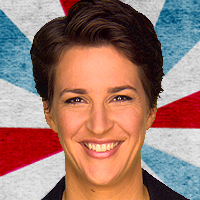
MSNBC host Rachel Maddow
And if that’s what CNN thinks, then it may be what MSNBC’s Rachel Maddow thinks as she also plays the Russia card for all it’s worth. It may also be what The Washington Post has in the back of its mind even while hyperventilating about Russian President Vladimir Putin’s “crime of the century, an unprecedented and largely successful destabilizing attack on American democracy.”
The New York Times also got caught up in its enthusiasm to hype the Russia-gate case on June 25 when it ran a story slamming Trump for “refus[ing] to acknowledge a basic fact agreed upon by 17 American intelligence agencies that he now oversees: Russia orchestrated the attacks [on Democratic emails], and did it to help get him elected.”
The “17-intelligence-agency” canard has been a favorite go-to assertion for both Democrats and the mainstream news media, although it was repudiated in May by President Obama’s Director of National Intelligence James Clapper and CIA Director John Brennan.
So, on June 29, the Times apparently found itself with no choice but to issue a correction stating: “The [Russia-hacking] assessment was made by four intelligence agencies — the Office of the Director of National Intelligence, the Central Intelligence Agency, the Federal Bureau of Investigation and the National Security Agency. The assessment was not approved by all 17 organizations in the American intelligence community.”
This point is important because, as Consortiumnews.com and other non-mainstream news outlets have argued for more than a month, it is much easier to manipulate a finding by hand-picking analysts from a small number of intelligence agencies than by seeking the judgments and dissents from all 17.
Despite the correction, the Times soon returned to its pattern of shading the truth regarding the U.S. intelligence assessment. On June 30, a Times article reported: “Mr. Trump has repeatedly cast doubt on the unanimous conclusion of United States intelligence agencies that Russia sought to interfere in the 2016 race.”
The Times’ phrase “unanimous conclusion” conveys the false impression that all 17 agencies were onboard without specifically saying so, although we now know that the Times’ editors are aware that only selected analysts from three agencies plus the DNI’s office were involved.
In other words, the Times cited a “unanimous conclusion of United States intelligence agencies” to mislead its readers without specifically repeating the “all-17-agencies” falsehood. This behavior suggests that the Times is so blinded by its anti-Trump animus that it wants to conceal from its readers how shaky the whole tale is.
Holes from the Start
But the problems with Russia-gate date back to the beginning. Where Watergate was about a real burglary, this one began with a cyber break-in that may or may not have occurred. In his June 8 testimony before the Senate Intelligence Committee, Comey conceded that the FBI never checked the DNC’s servers to confirm that they had truly been hacked.
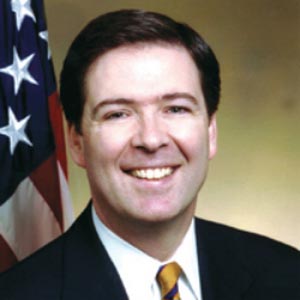
Former FBI Director James Comey
COMMITTEE CHAIRMAN RICHARD BURR: Did you ever have access to the actual hardware that was hacked? Or did you have to rely on a third party to provide you the data that they had collected?
COMEY: In the case of the DNC, and, I believe, the DCCC [i.e. the Democratic Congressional Campaign Committee], but I’m sure the DNC, we did not have access to the devices themselves. We got relevant forensic information from a private party, a high-class entity, that had done the work. But we didn’t get direct access.
BURR: But no content?
COMEY: Correct.
BURR: Isn’t content an important part of the forensics from a counterintelligence standpoint?
COMEY: It is, although what was briefed to me by my folks — the people who were my folks at the time – is that they had gotten the information from the private party that they needed to understand the intrusion by the spring of 2016.
The FBI apparently was confident that it could rely on such “a high-class entity” as CrowdStrike to tell it what it needed to know. Yet neither the Democratic National Committee nor CrowdStrike, the Irvine, California, cyber-security firm the DNC hired, was remotely objective.
Hillary Clinton was on record calling Putin a “bully” whose goal was “to stymie, to confront, to undermine American power” while Dmitri Aperovitch, CrowdStrike’s chief technical officer, is a Russian émigré who is both anti-Putin personally and an associate of the Atlantic Council, a pro-Clinton/anti-Russian think tank that is funded by the Saudis, the United Arab Emirates and the Ukrainian World Congress. The Atlantic Council is one of the most anti-Russian voices in Washington.
So, an anti-Putin DNC hired an anti-Putin security specialist, who, to absolutely no one’s surprise, “immediately” determined that the break-in was the work of hackers “closely linked to the Russian government’s powerful and highly capable intelligence services.”
Comey’s trust in CrowdStrike was akin to cops trusting a private eye not only to investigate a murder, but to determine if it even occurred. Yet the mainstream media’s pack journalists saw no reason to question the FBI because doing so would not accord with an anti-Trump bias so pronounced that even journalism profs have begun to notice.
Doubts about CrowdStrike
Since CrowdStrike issued its findings, it has come under wide-ranging criticism. Cyber experts have called its analysis inconsistent because while praising the alleged hackers to the skies (“our team considers them some of the best adversaries out of all the numerous nation-state, criminal and hacktivist/terrorist groups we encounter on a daily basis”), CrowdStrike says it was able to uncover their identity because they made kindergarten-level mistakes, most notably uploading documents in a Russian-language format under the name “Felix Edmundovich,” a reference to Felix E. Dzerzhinsky, founder of the Soviet secret police.
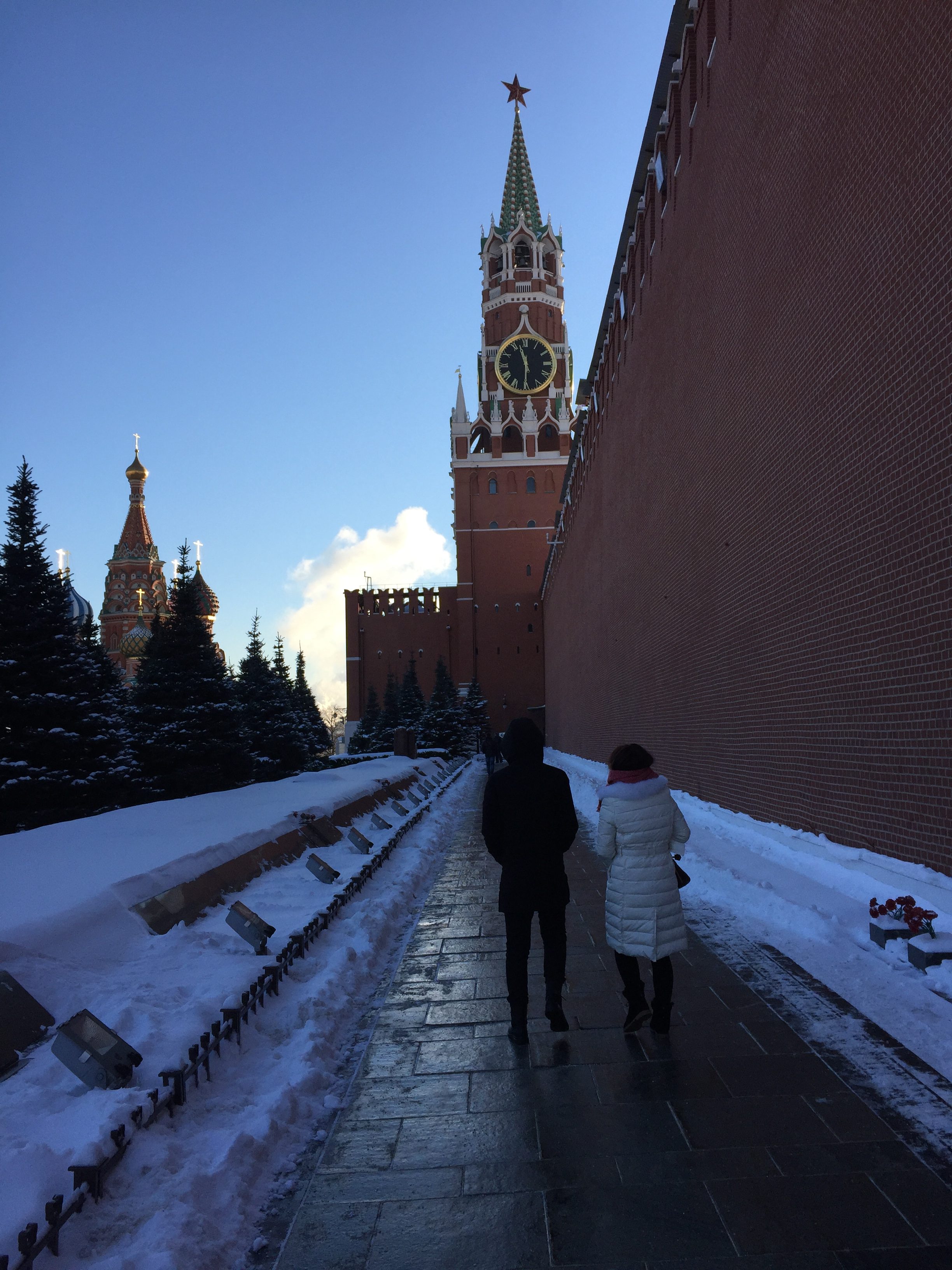
Couple walking along the Kremlin, Dec. 7, 2016. (Photo by Robert Parry)
“Raise your hand if you think that a GRU or FSB officer would add Iron Felix’s name to the metadata of a stolen document before he released it to the world while pretending to be a Romanian hacker,” wisecracked cyber-skeptic Jeffrey Carr.
Others noted how easy it is for even novice hackers to leave a false trail. In Seattle, cyber-sleuths Mark Maunder and Rob McMahon of Wordfence, makers of a popular computer-security program, discovered that “malware” found in the DNC was an early version of a publicly available program developed in the Ukraine – which was strange, they said, because one would expect Russian intelligence to develop its own tools or use ones that were more up to date.
But even if the malware was Russian, experts pointed out that its use in this instance no more implicates Russian intelligence than the use of an Uzi in a bank robbery implicates Mossad.
Other loose threads appeared. In January, Carr poured cold water on a subsequent CrowdStrike report charging that pro-Russian separatists had used similar malware to zero in on pro-government artillery units in the eastern Ukraine.
The Ukrainian ministry of defense and the London think tank from which CrowdStrike obtained much of its data agreed that the company didn’t know what it was talking about. But if CrowdStrike was wrong about the Ukraine case, how could everyone be sure it was right about the DNC?
In March, Wikileaks went public with its “Vault 7” findings showing, among other things, that the CIA has developed sophisticated software in order to scatter false clues – which inevitably led to dark mutterings that maybe the agency had hacked the DNC itself in order to blame it on the Russians.
Finally, although Wikileaks policy is never to comment on its sources, Julian Assange, the group’s founder, decided to make an exception.
“The Clinton camp has been able to project a neo-McCarthyist hysteria that Russia is responsible for everything,” he told journalist John Pilger in November. “Hillary Clinton has stated multiple times, falsely, that 17 U.S. intelligence agencies had assessed that Russia was the source of our publications. That’s false – we can say that the Russian government is not the source.”
Craig Murray, an ex-British diplomat who is a Wikileaks adviser, disclosed that he personally flew to Washington to meet with a person who was either the original source or an associate of the source. Murray said the motive for the leak was “disgust at the corruption of the Clinton Foundation and the tilting of the primary election playing field against Bernie Sanders.”
Conceivably, such contacts could have been cutouts to conceal from WikiLeaks the actual sources. Still, Wikileaks’ record of veracity should be enough to give anyone pause. Yet the press either ignored the WikiLeaks comments or, in the case of The Washington Post, struggled to prove that WikiLeaks was lying.
Unstable Foundation
The stories that have been built upon this unstable foundation have proved shaky, too. In March, the Times published a front-page exposé asserting that Trump campaign manager Paul Manafort “had regular communications with his longtime associate – a former Russian military translator in Kiev who has been investigated in Ukraine on suspicion of being a Russian intelligence agent.” But if the man was merely a suspected spy as opposed to a convicted one, then what’s the problem?
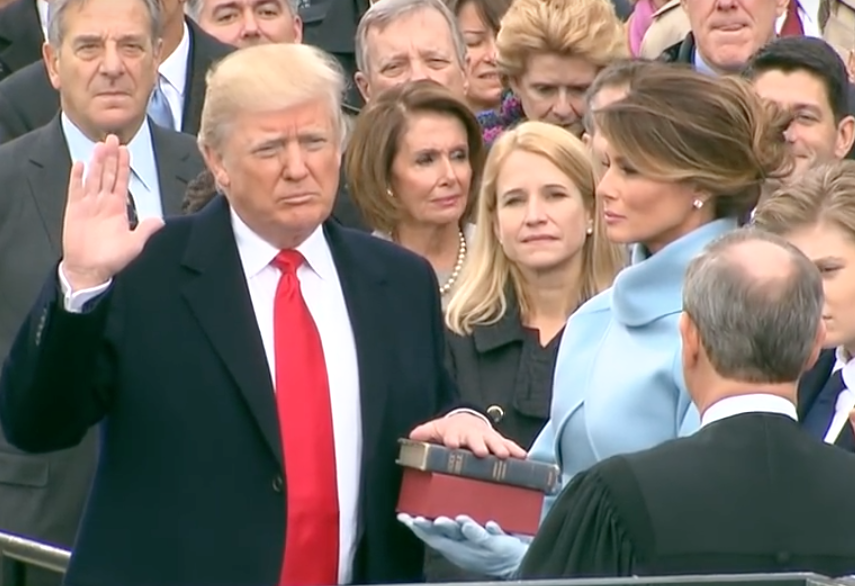
President Donald Trump being sworn in on Jan. 20, 2017. (Screen shot from Whitehouse.gov)
The article also noted that Jason Greenblatt, a former Trump lawyer who is now a special White House representative for international negotiations, met last summer with Rabbi Berel Lazar, “the chief rabbi of Russia and an ally of Russia’s president, Vladimir V. Putin.” But an Orthodox Jew paying a call on Russia’s chief rabbi is hardly extraordinary. Neither is the fact that the rabbi is a Putin ally since Putin enjoys broad support in the Russian Jewish community.
In April, the Times published another innuendo-laden front-page story about businessman Carter Page whose July 2016 trip to Moscow proved to be “a catalyst for the F.B.I. investigation into connections between Russia and President Trump’s campaign.”
Page’s sins chiefly consist of lecturing at a Moscow academic institute about U.S.-Russian relations in terms that The New York Times believed “echoed the position of President Vladimir V. Putin of Russia” and, on another occasion, meeting with a suspected Russian intelligence agent in New York.
“There is no evidence that Mr. Page knew the man was an intelligence officer,” the article added. So is it now a crime to talk with a Russian or some other foreign national who, unbeknownst to you, may turn out to be an intelligence agent?
Then there is poor Mike Flynn, driven out as national security adviser after just 24 days in office for allegedly misrepresenting conversations with Russian Ambassador Sergey Kislyak – exchanges during the Trump transition that supposedly exposed him to the possibility of Russian blackmail although U.S. intelligence was monitoring the talks and therefore knew their exact contents. And, since the Russians no doubt assumed as much, it’s hard to see what they could have blackmailed him with. [See Consortiumnews.com’s “Turning Gen. Flynn into Road Kill.”]
Yet the mainstream media eagerly gobbled up this blackmail possibility while presenting with a straight face the claim by Obama holdovers at the Justice Department that the Flynn-Kislyak conversations might have violated the 1799 Logan Act, an ancient relic that has never been used to prosecute anyone in its entire two-century history.
So, if the scandal is looking increasingly threadbare now, could the reason be that there was little or nothing to it when it was first announced during the final weeks of the 2016 campaign?
Although it’s impossible to say what evidence might eventually emerge, Russia-gate is looking more and more like a Democratic version of Benghazi, a pseudo-scandal that no one could ever figure out but which wound up making Hillary Clinton look like a persecuted hero and the Republicans seem like obsessed idiots.
As much as that epic inquiry turned out to be mostly a witch-hunt, Americans are beginning to sense the same about Washington’s latest game of “gotcha.”
The United States is still a democracy in some vague sense of the word, and “We the People” are losing patience with subterranean maneuvers on the part of the Democrats, the neoconservatives, and the intelligence agencies seeking to reverse a presidential election.
Like Benghazi or possibly even the Birthergate scam about President Obama’s Kenyan birthplace, the whole convoluted Russia-gate tale grows stranger by the day.